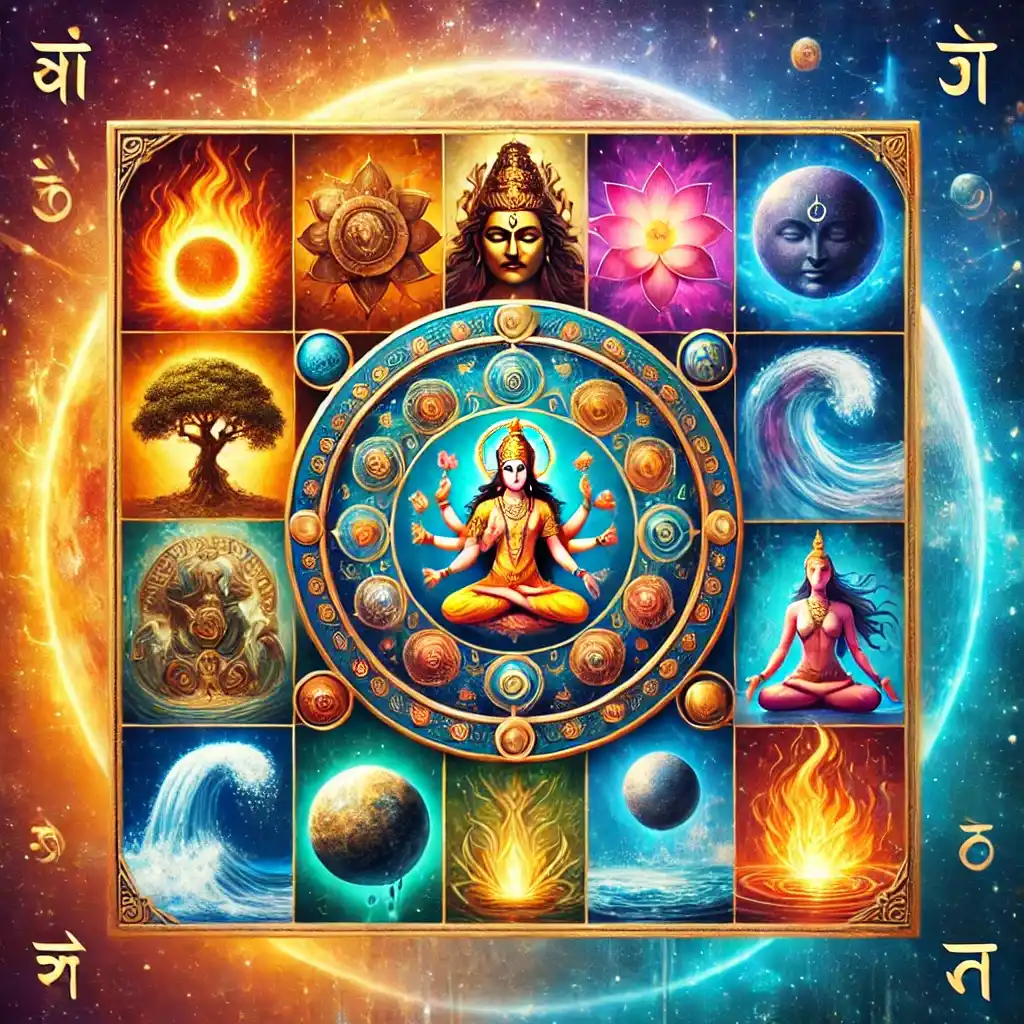
Spiritual Guidance and Inspiration
The Divine Elements of Nature in Hindu Mythology
In Hindu mythology, the concept of the 8 Vasus holds a significant place as they are considered to be the personifications of natural elements. These deities, often depicted as attending to the major gods, especially Indra, represent the various aspects of nature that sustain life on Earth. The Vasus, being elemental gods, are integral to the cosmic order, embodying the balance between the forces of nature. This blog explores the identities, mythological significance, and the roles of the 8 Vasus, their connection to other Hindu deities, and their relevance in the broader scope of Hindu cosmology.
The Identities of the 8 Vasus
Drona (Water): Represents water, one of the most vital elements for life. Symbolizes rivers, oceans, lakes, and all forms of water bodies. Water, in Hindu tradition, is considered sacred and is used in rituals for purification and blessings.
Dhruva (Pole Star): Represents constancy and steadfastness. Dhruva is the fixed star in the northern sky, symbolizing eternal truth and stability. In mythology, Dhruva is also a devotee of Vishnu who achieved immortality through his unwavering devotion.
Arka (Sun): Symbolizes the sun, the source of all life and energy. Arka represents light, warmth, and the cycle of day and night. The sun is worshipped as a powerful deity in Hinduism, often invoked for health, prosperity, and longevity.
Agni (Fire): Represents fire, a crucial element in Vedic rituals. Fire is considered the mouth of the gods, through which offerings are conveyed to the divine. Agni is central to Hindu ceremonies, from the lighting of the sacred fire in yajnas to the cremation of the dead.
Prabhasa (Dawn): Symbolizes the first light of day, dispelling darkness. Represents new beginnings, hope, and the eternal cycle of day and night. Dawn is often seen as a time of meditation and reflection in Hindu practices.
Prithvi (Earth): Embodies the Earth, the foundation of life. Prithvi is revered as a nurturing mother, providing sustenance and stability to all beings. The Earth is worshipped in various forms across Hindu rituals, emphasizing the importance of environmental stewardship.
Vayu (Wind): Represents the wind, the breath of life. Vayu is essential for movement, life, and the dispersion of seeds and pollen, facilitating growth and fertility. The wind is often invoked in prayers for its purifying and life-sustaining qualities.
Antariksha (Space/Ether): Represents the space or ether between the Earth and the heavens. Antariksha embodies the atmosphere, the medium through which sound travels, and the space in which all beings exist. Space is considered infinite, representing the vastness and mystery of the universe.
The Mythological Story of the Vasus
In the epic Mahabharata, the story of the Vasus is pivotal, particularly in the context of the life of Bhishma. According to the legend, the Vasus once attempted to steal the sacred cow Nandini from the sage Vashishta, which led to their curse to be born as mortals. The Vasus pleaded for mercy, and the curse was softened, allowing them to return to the heavens after a brief time on Earth. However, one Vasu, Prabhasa, was condemned to live a full life on Earth, and he was born as Bhishma, the grand patriarch of the Kuru dynasty.
Bhishma's life, marked by duty, sacrifice, and immense wisdom, reflects the divine qualities of the Vasus. His role in the Mahabharata underscores the influence of the Vasus in shaping the epic's narrative and moral framework.
Symbolism and Worship of the Vasus
The Vasus represent the essential elements that constitute the natural world, making them symbols of the cosmic balance. In Vedic rituals, these deities are invoked to bring harmony and prosperity to the proceedings. Their presence is believed to bless the ritual with the power of the elements they represent.
While the Vasus are not as widely worshipped as other major deities like Vishnu or Shiva, their roles are crucial in specific Vedic rituals and sacrifices. The invocation of the Vasus ensures that the elemental forces remain in balance, which is central to the Vedic understanding of the cosmos.
The Role of the Vasus in Hindu Cosmology
In Hindu cosmology, the Vasus are seen as guardians of the natural order. Their existence underscores the importance of the natural elements in sustaining life and maintaining the balance of the universe. The Vasus are often associated with the natural cycles, such as the changing seasons, the cycle of day and night, and the movement of celestial bodies.
This association reflects the Hindu belief in the interconnectedness of all life and the elements. The reverence for the Vasus emphasizes the need to live in harmony with nature, recognizing the divine presence in all aspects of the natural world.
Relevance in Contemporary Times
The concept of the Vasus holds relevance in today's context, particularly in terms of environmental consciousness. As personifications of natural elements, the Vasus remind us of the sacredness of the environment and the need to protect and preserve it.
The ancient wisdom embedded in the stories of the Vasus can inspire modern efforts to address environmental challenges and promote sustainable living.
Conclusion
The 8 Vasus are integral to the rich tapestry of Hindu mythology, representing the fundamental elements that sustain life. Their story, deeply intertwined with the broader narratives of Hindu epics, reflects the intricate relationship between the divine and the natural world. By understanding the significance of the Vasus, we gain insight into the ancient Hindu worldview that sees the elements of nature as sacred and interconnected.
As we navigate the complexities of the modern world, the teachings and symbolism of the Vasus can offer valuable lessons on the importance of balance, harmony, and respect for the natural world.

Explore the latest and most popular products available on Amazon, handpicked for your convenience! Whether you're shopping for tech gadgets, home essentials, fashion items, or something special, simply click the button below to view the product on Amazon. We’ve partnered with Amazon through their affiliate program, which means that if you make a purchase through this link, we may earn a small commission at no extra cost to you. This helps support our site and allows us to continue providing valuable content. Thank you for your support, and happy shopping!